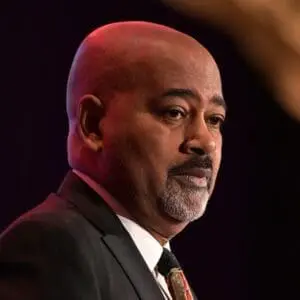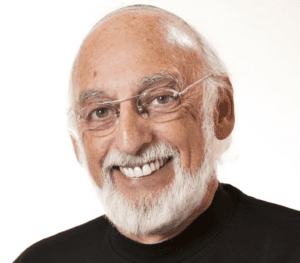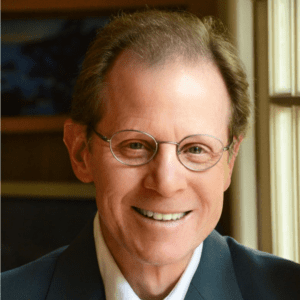Not too long ago, when our editorial staff worked out of a brick-and-mortar building, a large, framed collage hung in a corner of our office, with clippings from 40-plus years of Networker magazine issues. It was hardly something you’d hang over your fireplace mantle back home. It felt loud and disjointed, like an old puzzle whose pieces had been jammed to fit. But like so much misunderstood art, the more you sat with it, the more it grew on you.
This wasn’t just some haphazard mishmash; it was an homage to the field’s humble beginnings, its cultural guideposts, and the strange and sometimes contradictory ideological twists and turns that had brought therapists to the current moment. Passing by it each morning was a subtle reminder of what we at the magazine have done for more than four decades and continue to do: keep an ear to the ground for the field’s next seismic shift, while also taking stock of those that have come before.
In that spirit, we’re reprinting a collection of stories from some of the field’s modern pioneers, historians in their own right, who help remind us to always keep asking: Where have we been? And what comes next?
BESSEL VAN DER KOLK: The Truth about How We See Trauma
In tracking the historical contours of our culture’s ambivalent relationship with trauma, what’s ahead for the field?
KEN HARDY: Speaking of Race, Power, and Privilege
What can our field’s entrenched reluctance to name and discuss issues of race and social justice tell us about the path forward?
JOHN GOTTMAN: The Couples Therapy Revolution
What forces created the major turning points in couples therapy?
DAN SIEGEL: Bringing Brain Science into Therapy
How have we connected the dots between scientific advances and our field’s evolving view of mental health?
Bessel van der Kolk
Bessel A. Van der Kolk, M.D., is a clinician, researcher and teacher in the area of post-traumatic stress. His work integrates developmental, neurobiological, psychodynamic and interpersonal aspects of the impact of trauma and its treatment. Dr. van der Kolk and his various collaborators have published extensively on the impact of trauma on development, such as dissociative problems, borderline personality and self-mutilation, cognitive development, memory, and the psychobiology of trauma. He has published over 150 peer reviewed scientific articles on such diverse topics as neuroimaging, self-injury, memory, neurofeedback, Developmental Trauma, yoga, theater and EMDR.
He is founder of the Trauma Center in Brookline, Massachusetts and president of the Trauma Research Foundation, which promotes clinical, scientific and educational projects. His 2014 #1 New York Times best seller, The Body Keeps the Score: Brain, Mind, and Body in the Treatment of Trauma, transforms our understanding of traumatic stress, revealing how it literally rearranges the brain’s wiring – specifically areas dedicated to pleasure, engagement, control, and trust. He shows how these areas can be reactivated through innovative treatments including neurofeedback, somatically based therapies, EMDR, psychodrama, play, yoga, and other therapies.
Kenneth V. Hardy
Kenneth V. Hardy, PhD, is President of the Eikenberg Academy for Social Justice and Clinical and Organizational Consultant for the Eikenberg Institute for Relationships in NYC, as well as a former Professor of Family Therapy at both Syracuse University, NY, and Drexel University, PA. He’s also the author of Racial Trauma: Clinical Strategies and Techniques for Healing Invisible Wounds, and The Enduring, Invisible, and Ubiquitous Centrality of Whiteness, and editor of On Becoming a Racially Sensitive Therapist: Race and Clinical Practice.
John Gottman
John Gottman, Ph.D., was voted one of the Top 10 Most Influential Therapists of the past quarter century and was recently honored with the 2021 Lifetime Achievement Award by the Psychotherapy Networker. Professor Emeritus in Psychology at the University of Washington, Dr. Gottman is known for his work on marital stability and relationship analysis through scientific direct observations, self-report and physiology. He is the author or co-author of over 200 published academic articles and more than 45 books, including the bestselling The Seven Principles for Making Marriage Work; What Makes Love Last; The Relationship Cure; and Why Marriages Succeed or Fail. He is the co-founder of The Gottman Institute and Affective Software, Inc., which has created a tele-therapy technology that will live on cell phones, computers, and tablets to assist therapists in couples therapy and offer direct relationship building services directly to couples. Learn more at Gottman.com.
Dan Siegel
Dan Siegel, MD, is the founder and director of education of the Mindsight Institute and founding codirector of the Mindful Awareness Research Center at UCLA, where he was also coprincipal Investigator of the Center for Culture, Brain and Development and clinical professor of psychiatry at the School of Medicine. An award-winning educator, he’s the author of five New York Times bestsellers and over 15 other books, which have been translated into over 40 languages. As the founding editor of the Norton Professional Series on Interpersonal Neurobiology (IPNB), he’s overseen the publication of over 100 books in the transdisciplinary IPNB framework, which focuses on the mind and mental health. A graduate of Harvard Medical School, Dan completed his postgraduate training at UCLA specializing in pediatrics, and adult, adolescent, and child psychiatry. He was trained in attachment research and narrative analysis through a National Institute of Mental Health research training fellowship focusing on how relationships shape our autobiographical ways of making sense of our lives and influence our development across the lifespan.
















